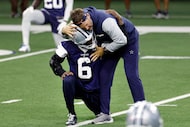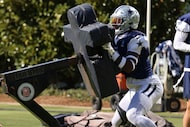The hard conversations that Brian Schottenheimer talked about this week, that therapists say are precisely what are needed during times of crisis — they only flow one direction in a newspaper column. Not much I can do about that, but I want to welcome you to my confessional for the first time in 16 years.
Those of us who marveled at professional athletes when we were young find very different reasons for inspiration as we grew older. I have a hard time believing it was back in August 2009 when Josh Hamilton faced the music in Anaheim, talking openly about a relapse he had gone through that spring in Arizona after pictures had been released online. That wasn’t the only time I admired him back then, as he was generally open to talking about how he had ruined his life for a few years through drug abuse and was just taking it one day at a time in recovery.
So I wrote a column in the Sunday paper about my own drinking issues, not quite sharing everything but talking about being just three months into sobriety and the challenge that I was facing in years ahead. It drew more email responses than anything I ever wrote about Terrell Owens or Jerry Jones or Dirk Nowitzki or the other larger-than-life topics of Dallas sports in that era.
Reading about Marshawn Kneeland, listening to Schottenheimer and reading the comments from Dak Prescott and Solomon Thomas, two players who had the unpleasant business of dealing with their own family suicides, has reminded me that the need for those conversations — for all of us, not just the best football players in the world gathered in a locker room — never stops. It seems especially true at a time when polite conversation has left the building, apparently never to return, in our political world.
Cowboys
In addition to living in a polarized landscape, we also see only the best of people (or whatever they care to show us) on Instagram. I have no insight as to what led to Kneeland’s issues, beyond what has been told about his mother and father, but when we tend to be bombarded by others apparently living their best lives, our own troubles multiply. It feels like we’re the only ones that even have them because everyone else is partying in Cabo.
That’s why I want to say that in this pretty good life I’ve been allowed to lead, writing columns for The Dallas Morning News for the last 27 years and spending 22 of those years also appearing on ESPN, I haven’t gotten on an airplane in more than 20 years without my good friend, clonazepam, who sometimes goes by the name KlonoPIN.
In 2001, I did not know what panic attacks were. Didn’t even really think they existed. Figured they were just something the weak-minded succumbed to at their lowest moments. Then I was flying to Atlanta to cover the Masters (again, I don’t have the worst job in the world, and I realize that). All of a sudden, I had to get off the plane. Unable to do that, I had to at least move. Sitting in my seat, I felt like I couldn’t take a deep breath and was about to swallow my tongue. I walked back to the restroom at the back of the plane at least four times before a flight attendant told me I needed to sit down.
It was debilitating, especially for someone who had flown regularly as much as I had and never thought twice about it.
I have not flown anywhere since that day — April 4, 2001 — without prescription medication. A few times I just had it in my pocket, the comfort of knowing it was there being enough. Generally, I just take it a half hour before boarding. It doesn’t put me to sleep or make me loopy at all, I mostly read on airplanes, even on a recent trip to Italy (you can knock out a lot of pages on a Philadelphia-to-Naples overnight while others are sleeping).
I used to laugh at people who were scared to fly, and actually, my issue has nothing to do with fear of crashing or being worried about turbulence. That doesn’t bother me. It’s a simple loss of control that becomes overwhelming if I don’t treat it. So I do. And I have advised others who have expressed issues with flying or claustrophobia to see a doctor. It’s life-changing. For a few years, I still hated the idea of long flights. Even the possibility of a Cowboys playoff game in Seattle had my palms sweating. But having learned when to take my little pill, understanding that I am far from the only one on the flight who needs medication to have a normal trip, it’s all good. I went with the Cowboys to London in 1986 and 1993 — would love go to again if that happens — but I skipped their last trip there in 2014 because my palms got clammy at the prospect of that door closing for nine hours.
Other than a few family members, no one knows any of this. Until now, anyway.
You don’t have to be a football player to want to hide your weaknesses, your fears from your friends. But then imagine if you are that football player — a normal flawed human being like the rest of us, except for that exceptional speed or skill that allows you to play a game for a living. And think about, in a world built on toughness, trying to share the things that make you scared without being ridiculed.
The Cowboys seem to be handling this most awful time about as well as they possibly can. But if we could all talk openly about our fears and understand there are tremendous options out there, ready and willing to help us deal with the hurdles that life throws at us — whatever they may be — maybe the number of times we are left shaking our heads over a young person’s suicide can at least be reduced.
Mental Health ResourcesThe Here For Texas Mental Health Navigation Line: Grant Halliburton Foundation initiative connects North Texans with mental health resources customized to each caller. 972-525-8181 or HereForTexas.com.National Suicide Prevention Lifeline: 24-hour crisis hotline at 800-273-8255. Confidential online chat is available at suicidepreventionlifeline.org.Crisis Text Line: To get 24-hour support, text “HOME” to 741741. More information at crisistextline.org.North Texas Behavioral Health Authority: 24-hour crisis hotline. 866-260-8000 or ntbha.org.Suicide and Crisis Center of North Texas: Speak to a trained counselor on the 24-hour hotline at 214-828-1000, 800-273-8255 or sccenter.org. Cowboys’ Stephen Jones praises head coach Brian Schottenheimer for handling of trying week
Cowboys’ Stephen Jones praises head coach Brian Schottenheimer for handling of trying week
The Cowboys’ first-year head coach has been thrust into a difficult situation, but has impressed those around him with his handling of it.
 DeMarvion Overshown set to return for Cowboys-Raiders, but does so with ‘one less brother’
DeMarvion Overshown set to return for Cowboys-Raiders, but does so with ‘one less brother’
Overshown and Cowboys teammates are still reeling from the loss of Marshawn Kneeland, someone Overshown called “a brother, a teammate and a great human.”
Find more Cowboys coverage from The Dallas Morning News here.
